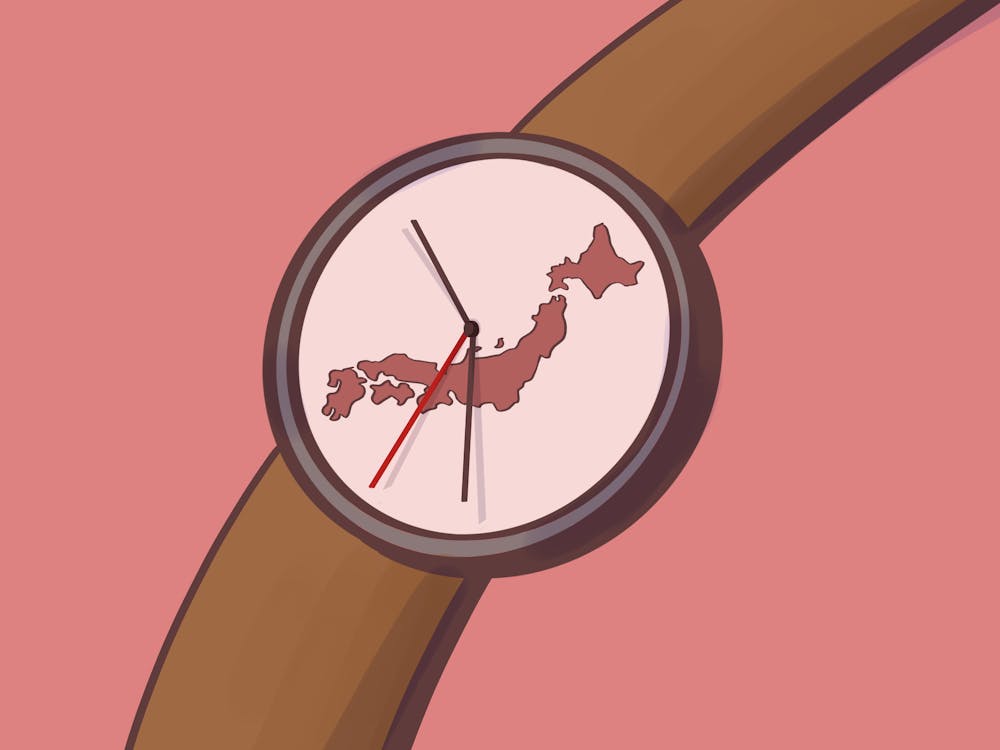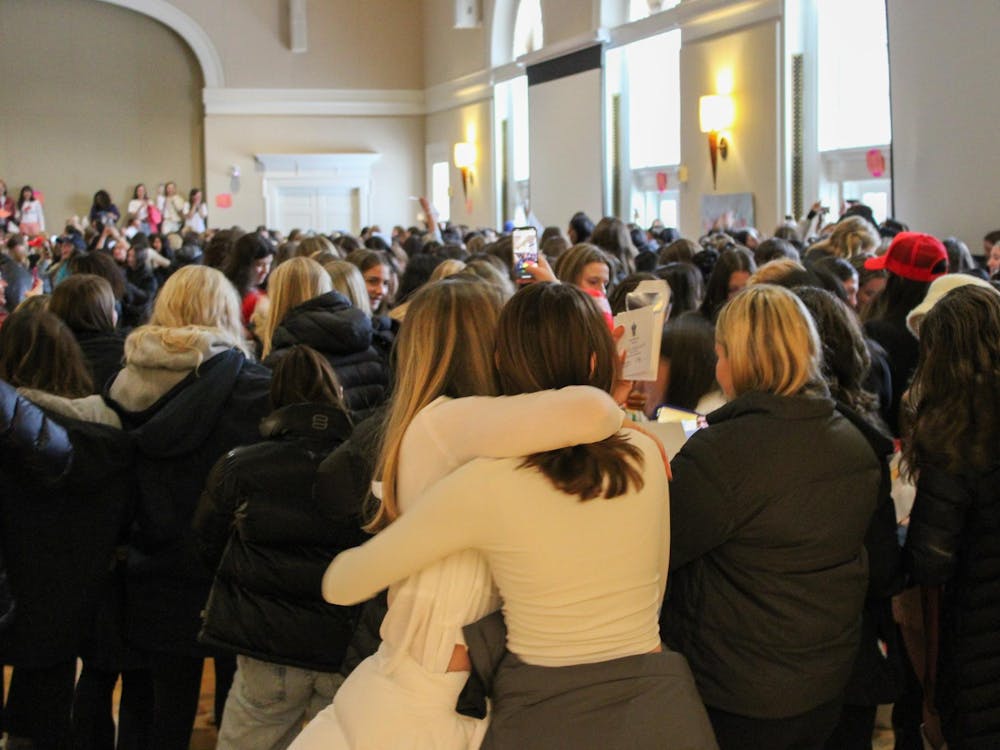Meet Jo Watts. A little more than two weeks ago, the third-year English major was preparing to return to civilian life. The national guardsman had already completed one tour of duty in Iraq and had also been deployed for relief work during Hurricane Isabel. He was supposed to be released from the National Guard April 23. Instead, he was notified that June 8, he would be leaving for another tour of duty in the Middle East with the 2nd Battalion of the 183rd cavalry out of Suffolk, Va.
Watts served in Iraq for nearly all of 2005, from Jan. 1 to Dec. 15. Unsure of his duty for his second deployment, Watts said the first time he went to Iraq as "military police" he took part in detainee operations, route patrols, perimeter security and convoy security.
In general guardsmen may provide ground transportation support or be part of a command and control element, according to Lt. Col. Chester C. Carter, III, the public affairs officer for the Virginia National Guard.
Watts is scheduled to serve 400 days. According to Watts, however, an important phrase to keep in mind regarding the military is "Everything is subject to change."
"The first time we were sent over as military police ... our mission changed every two months," Watts said. "At any point during your deployment they can extend you, they can change what you're doing [and] they can change who you're with."
Though his duties might change once he arrives, Watts' feelings about his second deployment already have.
"At drill the other month, I was looking around the unit and you can divide the unit right down the middle," he said. "On one side of the line [there are] all the people that went on the last deployment and on the other side [there are] a bunch of 17- and 18-year-old privates that haven't done anything. And by looking at their faces you can see the difference in the two facing the deployment. The new privates look very ... scared and I have to wonder if I looked like that the first time around."
A little less nervous, a little more experienced, Watts said he feels better prepared for his second deployment.
"Having been over there once and knowing where I'm going to go this time, I feel like I know better what to expect," Watts said. "I know what the surrounding land is like. I know what the people are like. I know what not to believe [and] what to believe."
Making a difference?
It's difficult for Watts to encounter someone and not be asked whether the United States is making a difference in Iraq. To this question, he immediately responds, "no." Yet he goes on to add that he has seen soldier impacting Iraq through the lives of children.
"I don't think we belong there; now it's a question of we're there, what do we do now," he said. "Historically speaking, if you look at all of the countries we've occupied ... that turned out the way we wanted them to ... We were there for decades."
Watts added that in principle, he agrees that the U.S Army should remain in Iraq "until the job is done," but he is not sure how the United States can determine when the job is done.
"We're not fighting on single enemy," he said. "It's not like there is any one person we can vilify, capture and then declare victory over. We're fighting an idea right now ... You remove one terrorist cell and instantly there are three more to replace it."
Nevertheless, Watts believes soldiers are making a difference in the lives of Iraqi children --- something that he said is not portrayed enough in the media.
"There's a lot people don't see," Watts said. "There are lots of good things going on over there, if not on the national level then on the individual civilian level ,that don't get broadcasted on the news."
Watts described his post during his first tour of a duty near an "Iraqi ghetto," a low-income area where children begged for food and water. The soldiers would give them toys and coloring books. The children often threw debris into the middle of the road whenever soldiers were driving by, hoping for the chance to speak with them, according to Watts. The guardsmen would simply clear the debris out of the way and keep driving.
One day, however, they came across something that was a little more difficult to brush aside.
"We came around the corner...and there was an entire burned out car frame and we stopped," Watts said. "All the kids were boys...we asked [them] who did this and they all said 'I don't know.' [We] could tell they were lying. I saw this little girl standing off by herself ... and I ... asked her, 'Who put this here?' and she pointed straight to the boys. We gave her all of our food and water ... The next day we came out. She was right there with the boys and she wanted to know if her friends could come talk to us, we said, 'Sure.'"
Even to this day, Watts keeps the note he received from the young girl.
"Her name was Saha," Watts said. "She was 11 years old ... It said, 'We love you not just because you bring us sweets but just because we do. We don't want you to leave.' And she signed her name."
And though the current Iraqi government may frown upon U.S. occupation, Watts puts his faith in the children.
"I hope that in 15 to 20 years when these kids are getting to the age when they're ready to start running the government that they will look back on the U.S. occupation differently than the current generation of leaders does," Watts said. "I hope that maybe at that point that's when we'll see changes taking place in the country."
That is not to say the United States has not had any impact, Watts said.
"If you go to Baghdad right now you will see women wearing Western clothes," he said. "That's something you never would have seen 10 years ago."
Atmosphere at home
Whether the American people believe the U.S. presence in Iraq is effective or not, in no way does Watts feel there is a lack of support for the soldiers as there was during the Vietnam War. Unlike the soldiers in Vietnam who, upon returning, were accused of being "un-American," Watts said everyone he encounters has been "100 percent supportive."
"I think the American people learned from their mistakes [in Vietnam] and realized even if the war is unpopular it's not the individual soldier that is at fault," Watts said. "It's the administration that plans the war that should be held responsible."
With about six weeks left until he leaves, Watts said he feels more prepared for deployment than the first time. Yet family and friends cannot help but worry and enjoy the short time they have left with him.
"I think that for the most part we're trying to go about things normally," said second-year College student Jen Wiley, Watts' girlfriend of slightly more than a year. "It's still in the back of your head. You know that time is short, you know that every moment counts."
Neither Watts nor his family were expecting him to be deployed a second time, considering the fact that he was supposed to leave the Guard last Monday.
"I'm not real happy about it," Watts' mother, Vickie, said. "I feel like we were lucky enough to go over there once and come back and I had not planned on him going again. ... I support him 100 percent, and I support the troops over there 100 percent."
Knowing what to expect this time, Watts finds himself less apprehensive and more confident as he prepares to return to Iraq.
"I've survived it once ... I can do it again."





